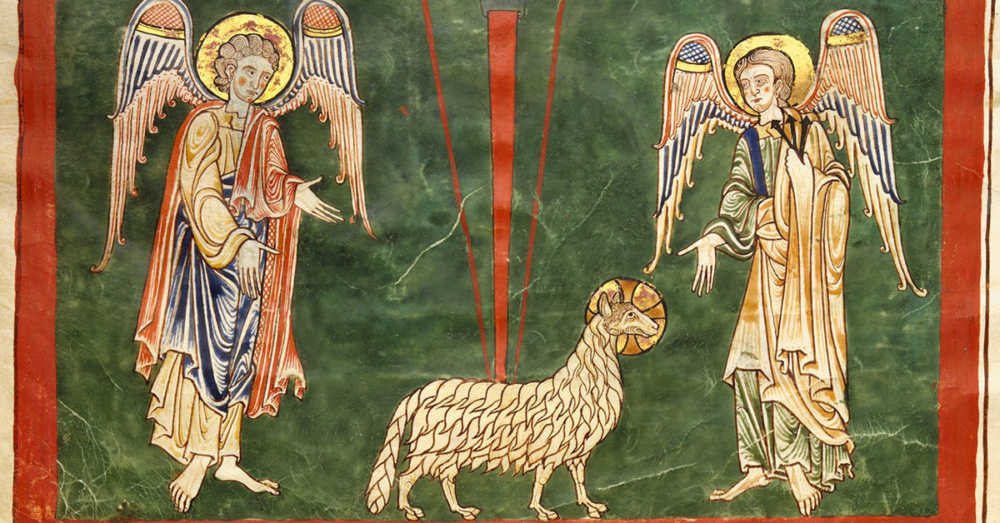We run our website the way we wished the whole internet worked: we provide high quality original content with no ads. We are funded solely by your direct support. Please consider supporting this project.

What Is God’s Glory?
In John 12 we find a view of God’s glory that challenges many modern notions of what the glory of God means. In this passage, we find that Jesus was “troubled” by the cross that lay ahead to such an extent that he wanted to cry out, “Father, save me.” But Jesus quickly expresses his resolve to go forward by saying, “No, it was for this very reason that I have come to this hour.” Then, with a view towards his crucifixion, Jesus exclaims: “Father, glorify your name,” at which point the voice of the Father thunders from the sky: “I have gloried it, and will glorify it again.” Jesus then goes on to declare: “when I am lifted up from the earth, I will draw all people to myself.” And just to make sure readers did not miss the point, John adds: “He said this to show the kind of death he was going to die” (12:27-8, 31-3).
This passage unambiguously identifies Jesus’ crucifixion as the “hour” when he will “glorify” the Father’s “name.” In ancient Jewish culture, to speak of a person’s “name” was to speak about their character and reputation. So, Jesus and the Father are both indicating that the Father’s character would most clearly shine forth—be “glorified”—when Jesus was crucified. While Jesus reflects the Father’s cruciform character throughout his ministry, the Father is “most glorified through the…‘lifting-up’… of the Son,” as Andrew Moody notes. Similarly, Gary Burge observes that, while God was of course glorified in Jesus’ miracles, it is only “on the cross that the mysterious, unfathomable glory of God is to be found.”
Colin Gunton argued that “[The glory of Christ is] lived up on the cross, and only through the trial of death is elevated to the glory that is reigning with the Father… if it is true that those who have seen him have seen the Father, then it is the Father who is revealed in the incarnate humanity of this man glorified through humbling.”
On top of this, Jesus tells us that it was “for this very reason” that he came into the world. As N.T. Wright puts it, the supreme glorification of the Father on the cross was “the climax and purpose of his whole work.” For, as Wright goes on to note, “in being thus ‘lifted up’…Jesus will draw all people to himself. How could it not be so, if indeed his cross is the true revelation of the true God, and if what we see in that revelation is the face of love?”
Now, if the crucifixion is the “climax and purpose of Jesus’ work,” we should understand everything else Jesus taught and did from this vantage point. To put it differently, since the cross was the supreme glorification of the Father, then the many other lesser ways Jesus glorified the Father should be understood as anticipating, and pointing toward, this event.
Let’s think about this another way. If Jesus is the center to which all Scripture points, then the cruciform glory of God that was supremely revealed on the cross must be regarded as the epicenter of this center. On this note, it’s significant that, when the resurrected Jesus “explained… all Scriptures concerning himself” to the disciples on the road to Emmaus, it was primarily to demonstrate that “the Messiah [had] to suffer these things,” which the disciples themselves had witnessed (Lk 24:26-7). And later, when Jesus “opened” the “minds” of the apostles “so they could understand the Scriptures,” it was primarily so they could see that it declared that “[t]he Messiah will suffer and rise from the dead on the third day” (vv.45-6).
What a strange glory!
—Adapted from Cross Vision, pages 37-38
Category: General
Tags: Character of God, Cross Vision, Crucifixion, Crucifixion of the Warrior God, Cruciform Theology, Glory
Related Reading

Cross Vision Coming Soon!
In Greg’s new book, Cross Vision, he explains how the crucifixion of Jesus makes sense of the violent portraits of God in the Old Testament. His groundbreaking “cruciform hermeneutic” will change the way that you read the Bible! While Crucifixion of the Warrior God laid out Greg’s case in detail for an academic audience, Cross Vision…

How NOT to be Christ-Centered: A Review of God With Us – Part III
In the previous two posts on Oliphint’s God With Us, we’ve seen that Oliphint is trying to reframe divine accommodations in a Christ-centered way, but that what he means by this is not that he is going to derive his understanding of God from Christ, but that he is going to use the “hypostatic union”…

When the Law Demanded the Death Penalty
The Sinai covenant is significantly structured around violence. It motivates behavioral conformity by promising rewards and threatening violence. Without the threat of violence, the law looses its “teeth.” If the law is an acquiescence to sin, then the divinely sanctioned violence that is associated with it must also be considered an acquiescence to sin. The…

Early Anabaptists and the Centrality of Christ
In a previous post, I wrote about the Christocentric interpretation of the Scriptures espoused by the magisterial Reformers, specifically Luther and Calvin. Their hermeneutic was focused on the work and the offices of Christ, but in my opinion the Anabaptists surpasses their approach because it focused on the person of Christ with an unparalleled emphasis…

Divine Accommodation and the Cross: where Calvin was onto something
Over the last few posts, I’ve been arguing that the cross represents the thematic center of everything Jesus was about. Hence, rather than striving to have a “Christocentric” theology — which is so broad it means next to nothing—we ought to sharpen our focus by striving for a “cruciform” theology. I then offered some suggestions…

Do We Read Bible-Violence to Children? (podcast)
Greg on children and Bible violence. Episode 658 http://traffic.libsyn.com/askgregboyd/Episode_0658.mp3
